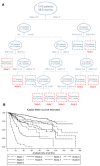The monocyte to red blood cell count ratio is a strong predictor of postoperative survival in colorectal cancer patients: The Fujian prospective investigation of cancer (FIESTA) study
- PMID: 28529608
- PMCID: PMC5436248
- DOI: 10.7150/jca.18000
The monocyte to red blood cell count ratio is a strong predictor of postoperative survival in colorectal cancer patients: The Fujian prospective investigation of cancer (FIESTA) study
Abstract
Background and Aims: We sought to evaluate the prognosis of preoperative blood routine parameters for the mortality of colorectal cancer patients after surgery by eliciting a subset of data from the ongoing Fujian prospective investigation of cancer (FIESTA) study. Methods: 1318 colorectal cancer patients with completed survival data were enrolled between 2000 and 2008. Effect-size estimates are expressed as hazard ratio (HR) and 95% confidence interval (CI). Results: The median follow-up time was 58.6 months. Elevated levels of neutrophil (adjusted HR, 95% CI, P: 1.22, 1.06-1.41, 0.006) and monocyte (1.32, 1.06-1.65, 0.013) were significantly associated with an increased risk of colorectal cancer mortality, whereas that of lymphocyte (0.60, 0.44-0.82, 0.001) and red blood cell count (0.20, 0.09-0.43, <0.001) were significantly associated with a reduced risk. Additionally, remarkable significance was reached for the neutrophil-to-lymphocyte ratio (1.12, 1.06-1.19, <0.001) and lymphocyte-to-monocyte ratio (0.60, 0.46-0.79, <0.001). Based on individual effect-estimates, a new derivate, monocyte to red blood cell count ratio namely MRR was created, and its association with colorectal cancer mortality was strikingly significant (1.48, 1.18-1.85, 0.001). Notably, elevated MRR was significantly associated with the mortality of early stage colorectal cancer, especially in patients with stage I-II (1.63, 1.04-2.56, 0.034), invasion depth T1-T2 (2.85, 1.45-5.61, 0.002), regional lymph node metastasis N0 (1.89, 1.29-2.77, 0.001) and tumor size ≤ 4.5 cm (1.84, 1.25-2.70, 0.002). Conclusions: We created a new derivate MRR, which was superior over classic blood routine derivates, and importantly the MRR exhibited a stronger ability in predicting poor prognosis of colorectal cancer, especially at the early stage.
Keywords: Blood routine parameter; Colorectal cancer; FIESTA study.; Prognosis; Survival.
Conflict of interest statement
Competing Interests: The authors have declared that no competing interest exists.
Figures

Similar articles
-
Elevated preoperative neutrophil-to-lymphocyte ratio can predict poor survival in early stage gastric cancer patients receiving radical gastrectomy: The Fujian prospective investigation of cancer (FIESTA) study.J Cancer. 2017 Apr 10;8(7):1214-1222. doi: 10.7150/jca.18707. eCollection 2017. J Cancer. 2017. PMID: 28607596 Free PMC article.
-
Preoperative blood-routine markers and prognosis of esophageal squamous cell carcinoma: The Fujian prospective investigation of cancer (FIESTA) study.Oncotarget. 2017 Apr 4;8(14):23841-23850. doi: 10.18632/oncotarget.13318. Oncotarget. 2017. PMID: 27852044 Free PMC article.
-
Preoperative metabolic syndrome and prognosis after radical resection for colorectal cancer: The Fujian prospective investigation of cancer (FIESTA) study.Int J Cancer. 2016 Dec 15;139(12):2705-2713. doi: 10.1002/ijc.30404. Epub 2016 Sep 15. Int J Cancer. 2016. PMID: 27560834
-
Prognostic significance of lymphocyte to monocyte ratio in colorectal cancer: A meta-analysis.Int J Surg. 2018 Jul;55:128-138. doi: 10.1016/j.ijsu.2018.05.030. Epub 2018 May 26. Int J Surg. 2018. PMID: 29807167 Review.
-
Low lymphocyte count and high monocyte count predicts poor prognosis of gastric cancer.BMC Gastroenterol. 2018 Oct 11;18(1):148. doi: 10.1186/s12876-018-0877-9. BMC Gastroenterol. 2018. PMID: 30305076 Free PMC article. Review.
Cited by
-
Association Between Immune-related Adverse Events and Clinical Outcome Following Nivolumab Treatment in Patients With Metastatic Renal Cell Carcinoma.In Vivo. 2020 Sep-Oct;34(5):2647-2652. doi: 10.21873/invivo.12083. In Vivo. 2020. PMID: 32871795 Free PMC article.
-
Additional diagnostic value of the monocyte to red blood cell count ratio and the product of lymphocyte count and albumin concentration in lung cancer management.Oncol Lett. 2023 Feb 15;25(4):135. doi: 10.3892/ol.2023.13721. eCollection 2023 Apr. Oncol Lett. 2023. PMID: 36909371 Free PMC article.
-
Different Risk Profiles for the Postsurgical Prognosis of Gastric Cancer Patients with Different Blood Types: The FIESTA Study.J Cancer. 2018 Jul 30;9(16):2885-2894. doi: 10.7150/jca.25408. eCollection 2018. J Cancer. 2018. PMID: 30123357 Free PMC article.
-
Prognostic Value of an Inflammation-Related Index in 6,865 Chinese Patients With Postoperative Digestive Tract Cancers: The FIESTA Study.Front Oncol. 2019 May 22;9:427. doi: 10.3389/fonc.2019.00427. eCollection 2019. Front Oncol. 2019. PMID: 31192131 Free PMC article.
-
Impact of long-term antihypertensive and antidiabetic medications on the prognosis of post-surgical colorectal cancer: the Fujian prospective investigation of cancer (FIESTA) study.Aging (Albany NY). 2018 May 24;10(5):1166-1181. doi: 10.18632/aging.101459. Aging (Albany NY). 2018. PMID: 29846174 Free PMC article.
References
-
- Chen W, Zheng R, Baade PD, Zhang S, Zeng H, Bray F. et al. Cancer statistics in China, 2015. CA Cancer J Clin. 2016;66:115–32. - PubMed
-
- O'Connell JB, Maggard MA, Ko CY. Colon cancer survival rates with the new American Joint Committee on Cancer sixth edition staging. J Natl Cancer Inst. 2004;96:1420–5. - PubMed
LinkOut - more resources
Full Text Sources
Other Literature Sources

